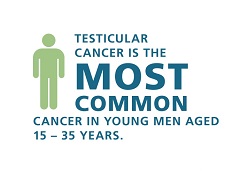By: Urology Care Foundation | Posted on: 13 Apr 2016

April is Testicular Cancer Awareness Month! It's a time of year to help educate people about how common this type of cancer is and what can be done to catch it early.
Testicular Cancer is the most common cancer in men ages 15 to 34. Still, it is fairly rare. About 8,700 men will be diagnosed in the U.S. this year, and the risk of death is small. It kills about 380 men in the U.S. every year.
Signs of a testicular tumor:
-
A painless lump in the testicle (the most common sign)
-
A feeling of weight in the scrotum
Swelling of the testicle (with or without pain) -
Pain or a dull ache in the testicle, scrotum or groin
How to Do a Testicular Self-Exam
Boys should start monthly testicular self-exams in their teen years. The best time to examine your testicles is right after a hot bath or shower. The scrotal skin is most relaxed at this time. The exam should be done while standing and only takes a few minutes.
-
Look for swelling in the scrotum
-
Gently feel the scrotal sac to find a testicle
-
Examine the testicles one at a time by firmly and gently rolling each testicle between the thumb and fingers of both hands to examine the entire surface
-
Note that it is normal for one testicle to be slightly larger than the other. It is also normal to feel a cord-like structure (the epididymis) on the top and back of each testicle
If you find a small, hard lump (pea-size), swelling or any other differences, contact a urologist as soon as you can. For more information, print a copy of our Testicular Cancer Fact Sheet or download our free Testicular Cancer Infographic.
Explore Further
Share Your Story
Have a story to share? The Urology Care Foundation invites you to share your experience with a urologic condition and how it has affected you or your family.
UrologyHealth extra®
Read the latest issue of UrologyHealth extra®, the Urology Care Foundation's patient-focused magazine.



